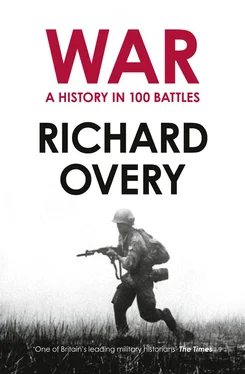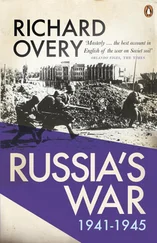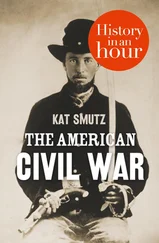In addition to the prospect of booty, soldiers have also been sustained, or alarmed, by religious symbols, superstitions, visions and omens. There are obvious reasons why appeals to the supernatural were important. Belief in a god or gods or the power of the sacred was common to almost all armies throughout history. Since victory was never certain, soldiers and their commanders searched for some sign that they enjoyed divine protection; indications that the opposite might be the case did not necessarily stop soldiers fighting, but it could be deeply demoralizing. The ancient Greek historian Herodotus described arguments in Athens over how to interpret the Delphic Oracle when the priestess predicted that an enemy from the east would bring inevitable woe to the city – ‘from the topmost roofs trickles black blood’ – but that all-seeing Zeus ‘gives a wooden wall’ for ‘divine Salamis’. The pronouncement was difficult to interpret, though it was widely regarded as a signal of impending doom. But the Athenian Themistocles insisted that the wooden wall meant ships, and that the city should spend its accumulated wealth on procuring a new fleet. His view prevailed and the Persian fleet was destroyed at Salamis a few months later. In the later siege of Constantinople, when the fearful Greek population of the city awaited the Ottoman onslaught, there was an eclipse of the full moon that left just a thin lunar crescent, symbol of their Islamic enemy. The inhabitants saw this as a profound omen of the city’s collapse; the Ottoman army rejoiced at such a clear indication of divine favour and a few days later the city was in their hands. Battles were fought by soldiers blessed by priests, buoyed up by favourable auguries and omens, or certain that death in a sacred cause would ensure a life hereafter.
The conditions of most battlefields were such that superstitious expectation offered a thin ray of hope that somehow, amidst the sheer arbitrariness of combat, you might survive where others perished. The context of fighting across the ages has been universally grim. Soldiers often fought after a long march, already exhausted, with bleeding or blistered feet. They were at the mercy of the weather, and mud, rain or snow made a tough assignment tougher still. Dirt, insects, infection and hunger added to a soldier’s routine woes. The anti-hero in Erich Maria Remarque’s All Quiet on the Western Front complains that his experience of war is only ‘despair, death, fear … an abyss of suffering’. The searing stories of the retreat of Napoleon’s Grande Armée from Russia in 1812 show what price ordinary soldiers paid for their leaders’ grand ambitions, as well as the civilians unlucky enough to be in the path of a desperate army. In battle, the physical demands are hard for anyone who has not experienced it to grasp. After the Battle of Blenheim in 1704, the defeated Comte de Mérode recorded that he had fought continuously for thirty hours, despite suffering an injured and swollen knee, had had no sleep, no food, and just one swig of water. This could be a soldier’s tale from any battle. ‘Why,’ asks William Wharton, ‘do humans, especially military humans, want to do things the hard way?’ Soldiering before the age of aircraft and long-range artillery was an inefficient way of utilizing manpower that too often had soldiers fighting in a daze of exhaustion, at the end of their tether, bleeding from unnoticed wounds, and all because of what their commanders asked of them. Small wonder that time and again in battle accounts, from swigs of rum before a naval engagement to the half pint of brandy served to Napoleon’s soldiers just before Austerlitz, alcohol is used to revive flagging spirits, to dull sharp fears or to combat the freezing climate.
Heat was just as debilitating as cold and a great many of the 100 battles recorded here were fought in searing temperatures and dry conditions that quickly turned the battlefield into a fog of churned-up dust or sand. The critical resource in all kinds of weather, more important for soldiers than any weapon, was water. It is what every wounded soldier asks for first. A shrewd commander makes sure that the army is camped near a supply of fresh water or that water can be ferried to the battlefield. Richard the Lionheart only won the battle at Arsuf because Crusader ships plied along the coast leading to Jaffa with barrels of water for the exhausted, sweaty Europeans in his army. Even then, men died of heat exhaustion on the way. It is hard to imagine having to fight amidst all the clamour and gore of the battlefield for hours on end with no prospect of water to assuage the debilitating effects of dehydration. American army recruits in the Second World War did ‘water hikes’ to prepare them for the reality of battle, marching 100 kilometres (60 miles) over two days in warm weather with just a 1-litre (2-pint) canteen to last the whole time. ‘My mouth starts sticking to itself,’ wrote William Wharton, ‘my tongue to the top of my mouth, my teeth to my lips, my lips to each other.’
There comes a moment in most battles whose outcome is decided in a day or so of combat when one side or the other senses victory and the other senses defeat. Since most soldiers can see little more of the battlefield than what is immediately around them and are given almost no information in the midst of a battle, the way that sense is communicated comes either from the exhortations of commanders if victory seems likely, or the flight of leaders who realize that they have lost. The effect when a commander flees – as at Bannockburn in 1314 when Edward II turned tail – can be immediately damaging. Flight or surrender is a fast-moving infection. Once it is evident, the willingness to continue fighting evaporates with a startling speed. One of the strangest phenomena in battle is the moment when soldiers, who only minutes before are firing muskets or hacking away at the enemy, realize that they have to save themselves. Of course, surrender was often not an option, and there are numerous accounts of battles ancient and modern in which a unit of soldiers or horsemen is annihilated where it stands, surrounded by a sea of enemies. What that moment of certain death means, when men are observed fighting with a frenetic energy against all the odds, self-evidently cannot be known. But where it is possible to flee, at the exact moment when confidence in the outcome collapses, soldiers do so, sometimes in good order, but in a great many battles in complete panic. They are then pursued, hunted down and butchered. Napoleon’s Imperial Guard at Waterloo hurled themselves into the fray with determination, but shortly after, as Wellington’s lines moved forward, they could be seen on their knees weeping and calling for mercy. Soldiers in flight experience a psychological transformation now that their only concern is to save themselves rather than to protect the group.
For ordinary soldiers, the comprehension that they have won a battle can take time to sink in, partly because a large battlefield is a messy and incoherent whole, in which fighting might continue for longer in one small part while overall victory is assured. The Battle of Austerlitz was essentially won by Napoleon by mid-day, but the fighting did not finish at one end of the field for another four hours. Even commanders often have only a hazy view of how a battle is going. They have relied until recently on primitive forms of communication once battle is joined. Very few armies imitated the Mongols, whose commanders would seek high ground in order to signal with coloured flags to their units about their movement on the battlefield. Navies were better adapted to complex signalling, but even here a naval mêlée could easily mask the overall balance of the battle. Otherwise, even with the advent of radio, it could be difficult to direct embattled units or to be confident that plans were being fulfilled. Victory slowly emerged from the literal fog of war only when the enemy abandoned the field, surrendered, or was surrounded and killed.
Читать дальше












